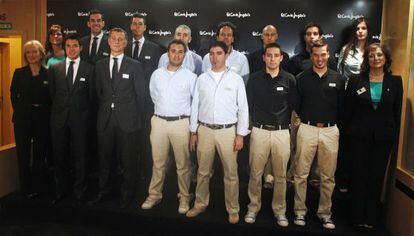Suits you: El Corte Inglés ends uniform gender discrimination
Male salesclerks could wear what they wanted while women had to don pant suits

A uniform for all of its staff. This is the decision recently made by department store El Corte Inglés to put an end to gender discrimination regarding the clothing of its salesclerks.
El Corte Inglés is Spain's largest chain. It began in Madrid in 1890 as a tailors (the name means The English Cut), on a site near its current flagship store. In 1934 the company was acquired by two partners, one of whom had learned the department-store business in Cuba, with the aim of creating an operation of that type. In the decades after World War II it grew prodigiously, and now has branches in all the larger Spanish cities, employing a total of 42,000 women and 18,500 men.
Until now the male salesclerks could choose what they wanted to wear, within a "seemly style of dress," according to company guidelines. El Corte Inglés gave its male employees a minimum of 360 euros a year for suits, shirts, ties and shoes. But the women were obliged to wear the clothes supplied to them by the company: a pant suit or skirt with a green blouse.
"Viewing proposals"
One of the objectives of the equality plan that the company started in 2008 was to "establish a homogeneous uniform standard for male and female staff." The text set a time-frame of one year. But it was not until this week that the new designs were presented, which male employees will be wearing in the store (youth, sales and sports departments). The explanation for the delay, says personnel director Pablo Tauroni, is that the company has been "viewing proposals" for the last two years.
In 2006, female salesclerks were able for the first time to opt between a skirt - until then obligatory - or a pant suit. Most of them choose the latter, the firm admits, because they consider it "more comfortable." From now on, the 18,500 male salesclerks will also be wearing the company's clothes.
Tauroni has termed the move a "landmark" in the matter of gender equality. The firm, however, has other pending business in this area. Three years after the approval of the plan, the two major Spanish labor unions, CCOO and UGT, evaluated its implementation. And the data revealed huge disparities. Though a majority of the company's staff was female (63 percent), only three percent of the women had management jobs, compared to 25 percent of the men. The company admits that there is an unequal distribution in terms of senior posts, but says it is working to correct the imbalance.










































